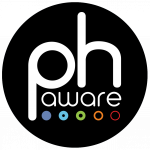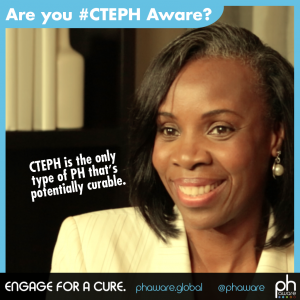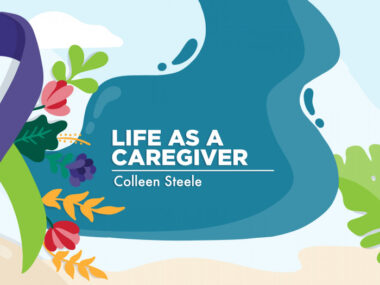Phaware Podcast: Arlene Shuler
Written by |

This podcast series, created and produced by phaware, is being offered as a regular guest feature on Pulmonary Hypertension News to bring the voices and life experiences of PH patients, family members, caregivers, healthcare specialists, and others to our readers. You can listen to the podcast directly, or read it via the transcript that runs just below.
I’m Aware That I’m Rare: Arlene Shuler
The phaware™ interview
CTEPH patient Arlene Shuler shares her pulmonary hypertension diagnosis story which started as breathlessness in 2005. Arlene is a dancer and awareness ambassador, who speaks to patients, medical professionals as well as staff of pharmaceutical companies to educate people about CTEPH and PH.
Arlene Shuler and I’m from Harlem, New York.
My connection to CTEPH, via pulmonary hypertension, was back in May of 2012 when I had a severe problem with my breathing. The doctors were like,  “Something’s going on,” and I had to be immediately hospitalized and they did a d-dimer blood test and it determined that I had blood clots in my system and because of my symptoms. They said I had blood clots in my lungs. I had the surgery to remove the blood clots in October 2013. They worked out very well. I’m doing most of the activities that I normally used to do, which is dance, and I love to dance. I’m not getting as winded when I come off the dance floor anymore. I don’t have to take any type of lung medications like everyone else is taking.
“Something’s going on,” and I had to be immediately hospitalized and they did a d-dimer blood test and it determined that I had blood clots in my system and because of my symptoms. They said I had blood clots in my lungs. I had the surgery to remove the blood clots in October 2013. They worked out very well. I’m doing most of the activities that I normally used to do, which is dance, and I love to dance. I’m not getting as winded when I come off the dance floor anymore. I don’t have to take any type of lung medications like everyone else is taking.
My journey stemmed from 2005. It was initially missed, I’m not going to say misdiagnosed, but it was diagnosed as asthma. I went on an inhaler for 28 days and then miraculously everything went well. Then in 2010, I started having some severe breathing problems and I knew I wasn’t overweight. I was like, “What’s going on with my body?” Then it started to escalate, and in 2012 I was going for a stress test. At the stress test appointment in Manhattan they immediately saw something was wrong with me. I don’t how I physically looked and they were like, “No, we’re taking you to the emergency room.” It was at that time when they took the blood test, a d-dimer test, and they said, “You have blood clots in your lungs.
I take life differently from other people. I’m more of a positive person so if something was wrong with me, which it was, I just try to let the doctors feel more comfortable with telling me what was going on, and as their comfortability became relaxed then they were able to say, “OK, this is what’s going on. This is what we think you should do.” My pulmonologist, she was so great with educating me, and the staff at the hospital was great at educating me. Everything was basically on point.
Awareness is so important to me because, just like asthma or any other type of respiratory infection, it’s always, “I have problems breathing, I can’t breathe.” That language is so ordinary, it’s so sameness, that we are trying to enlighten others to say, “OK, we can be same, but we don’t have to reinvent the wheel. But what other language can we use?” With Bayer with the CTEPH program, it’s basically being as a patient trying to educate the hospital staff, and the nurses of course, and then the hospital staff in Bayer itself, the staff with Bayer, to try to educate them on different ways of how we can get the information out to the public and to the medical profession.
My doctors back home and my doctors in Boston, because I had my operation in Massachusetts General Hospital in Boston, they call me and have me speak and ask me, can I speak to potential patients about the operation and about my personal experiences? So that’s one outlet for me to advocate for it. Then coming to the Bayer CTEPH meetings, that’s another way and speaking with guys like you.
People will be surprised to know that I don’t look like what I’ve been through. My illness is an invisible situation to most and it’s not until we had the Bayer film, I should say last year, and I told people, “OK, this is what happened last year in November. Look at this video.” They call and say, “Oh my gosh, I didn’t know it was that severe. I didn’t know you was going through all of this that you’re telling us.” Now they can actually personalize it, if you will, and hear what I had to say. They are just calling me left and right. It’s like, “Wow.”
I don’t want anyone to feel sorry for me because it’s not that type of situation, because I let them know I’m still here, I can still make a difference. I can still be a positive powerful impact to others.
Thank you for wanting to interview me. Thank you for being a part of phaware, because it’s situations such as this that’s going to educate not only patients but the other community of patients … [and] the PH, pulmonary hypertension, and other CTEPH patients as well.
My name is Arlene Shuler and I’m aware that I’m rare.
EVERYBODY HAS A STORY. WHAT’S YOURS?
phaware wants to share your pulmonary hypertension story with their engaged global audience. Whether you are a patient, caregiver, or medical professional, they are enlisting PH community members from across the globe. Visit www.phaware.global/podcast to share your story and to be considered for a future episode.
And learn more about pulmonary hypertension at www.phaware.global. #phaware #phawarepod
Note: Pulmonary Hypertension News is strictly a news and information website about the disease. It does not provide medical advice, diagnosis, or treatment. This content is not intended to be a substitute for professional medical advice, diagnosis, or treatment. Always seek the advice of your physician or other qualified health provider with any questions you may have regarding a medical condition. Never disregard professional medical advice or delay in seeking it because of something you have read on this website. The opinions expressed in this column are not those of Pulmonary Hypertension News or its parent company, Bionews Services, and are intended to spark discussion about issues pertaining to pulmonary hypertension.






Leave a comment
Fill in the required fields to post. Your email address will not be published.